Read based on the following criteria:
![]()
![]()
![]()
i have had many inquiries into the methods and means i use to teach Bible. Sometimes they are referred to as "brilliant" (probably heard myself say that ;) ) and sometimes as bemusing and occassionally a member visits who has accused me of blasphemy or some other heresy. i post the following, not as vindication, but rather just in case any other of you "revolutionary" teachers ever feel like you wish you had something to say in return to criticism you have received. Then again, it may be best to just be quiet. Sometimes the criticism is deserved and we need someone to shake us awake. Another good reason not to speak too quickly is that we don't make a very good Holy Spirit. It's His job to convict and protect, to guide to truth and redeem. Besides, you may find yourself changing your opinions and thoughts over time.
In fact i encourage you to do so.
Lastly, i know the risk of putting something like this in the public. There is something final about having something in "print" and "out there." While the Web is more dynamic than that i also know there's some element of truth to its finality. There is great risk in people thinking that i believe i know it all. Or worse yet, that it sounds like i DO know everything. i am most aware that perhaps it is the love of ideas, especially one's own, that is most dangerous. Don't misunderstand, i LOVE thinking new thoughts and sharing ideas. But it has its place.
"Little does a man realize that their love of ideas can be idolatry in its purest form. To present their beliefs so forcefully to another that the other has but to 'recognize their superiority' is to be idolatrous. To press your belief about the Creator of all men rather than offer Him is perhaps the most subtle form of idolatry the Body of Christ faces.
"How many times has the sharing of your ideas to the enlightenment of others left you with a feeling that you bettered them; that you improved their existence and without you they would have lived the rest of their life in a deprived state? In essence, when you ended feeling superior by your ideas ABOUT God and not really concerned about GIVING God.
"This is a subtle form of idolatry where we become the hidden object of our own desire. My ideas, my understanding of God, my church's beliefs about Truth become paramount to the real object of God's atonement: US, His people."
Therefore, these ideas i lay out here are not set in concrete but subject to revision. i share them only as one beggar tells another beggar where to find bread.
Let the sharing begin . . .
 Scripture
ScriptureEducation is not just a process at school:
"And thou shalt teach them diligently unto thy children, and shalt talk of them when thou sittest in thine house, and when thou walkest by the way, and when thou liest down, and when thou risest up. And thou shalt bind them for a sign upon thine hand, and they shall be as frontlets between thine eyes. And thou shalt write them upon the posts of thy house, and on thy gates." Deuteronomy 6:7-9
Success is first met with a willingness to succeed:
"For if there be first a willing mind, it is accepted according to that a man hath, and not according to that he hath not." II Corinthians 8:12
God's word is perhaps the best thing to study there is:
"Thy word is a lamp unto my feet, and a light unto my path." Psalm 119:05
"Finally, brethren, whatsoever things are true, whatsoever things are honest, whatsoever things are just, whatsoever things are pure, whatsoever things are lovely, whatsoever things are of good report; if there be any virtue, and if there be any praise, think on these things." Philippians 4:8
We are admonished to study:
"Study to show thyself approved unto God, a workman that needeth not to be ashamed, rightly dividing the word of truth." II Timothy 2:15
"But go ye and learn what that meaneth, I will have mercy, and not sacrifice: for I am not come to call the righteous, but sinners to repentance." Matthew 9:13
But study is only one part of the total picture for a Christian:
1Ths. 4:11 And that ye study to be quiet, and to do your own business, and to work with your own hands, as we commanded you." I Thessalonians 4:11
"Bear ye one another's burdens, and so fulfil the law of Christ." Galatians 6:2
"Wherefore take unto you the whole armour of God, that ye may be able to withstand in the evil day, and having done all, to stand. Stand therefore, having your loins girt about with truth, and having on the breastplate of righteousness; and your feet shod with the preparation of the gospel of peace; above all, taking the shield of faith, wherewith ye shall be able to quench all the fiery darts of the wicked. And take the helmet of salvation, and the sword of the Spirit, which is the word of God." Ephesians 6:13-17
There is a time an place for everything--even a time to close the books:
"And further, by these, my son, be admonished: of making many books there is no end; and much study is a weariness of the flesh. Let us hear the conclusion of the whole matter: Fear God, and keep his commandments: for this is the whole duty of man." Ecclesiasticus 12-12-13
Speaking on education, Mrs. White says the following:
"The Holy Scriptures are the perfect standard of truth, and as such should be given the highest place in education. To obtain an education worthy of the name, we must receive a knowledge of God, the Creator, and of Christ, the Redeemer, as they are revealed in the sacred word.
"Every Human being, created in the image of God, is endowed with a power akin to that of the Creator--individuality, power to think and to do. The men in whom this power is developed are the men who bear responsibilities, who are leaders in enterprise . . . It is the work of true education to develop this power, to train the youth to be thinkers, and not mere reflectors of other men's thoughts.
"Higher than the highest human thought can reach is God's ideal for His children. Godliness&emdash;godlikeness&emdash;is the goal to be reached." (Education 17-18)
You might know that Ellen White also wrote "true education is not the forcing of instruction on an unready and unreceptive mind. The mental powers must be awakened, the interest aroused," (ibid., 41) she also clearly said that it is "sin [that] not only shuts us away from God, but destroys in the human souls both the desire and the capacity for knowing Him." (ibid., 28-29; emphasis supplied)
From Christ's life we learn that "in childhood, youth, and manhood, Jesus studied the Scriptures. As a little child He was daily at His Mother's knee taught from the scrolls of the prophets. In His youth the early morning and and the evening twilight often found Him alone on the mountainside or among the trees of the forest, spending a quiet hour in prayer and the study of God's word. During His ministry His intimate acquaintance with the Scriptures testifies to His diligence in their study. And since He gained knowledge as we may gain it, His wonderful power, both mental and spiritual, is a testimony to the value of the Bible as a means of education." (ibid., 185-6; italics supplied)
Continuing, "the study of the Bible demands our most diligent effort and persevering thought. As the miner digs for the golden treasure in the earth, so earnestly, persistently, must we seek for the treasure of God's word . . . The mind, the heart, that is indolent, aimless, falls an easy prey to evil. It is on diseased, lifeless organisms that fungus roots. It is the idle mind that is Satan's workshop. Let the mind be directed to high and holy ideals, let the life have a noble aim, an absorbing purpose, and evil finds little foothold. (ibid., 190)
"The mind occupied with commonplace matters only, becomes dwarfed and enfeebled . . . As a safeguard against this degeneracy, and a stimulus to development, nothing else can equal the study of God's word. As a means of intellectual training, the Bible is more effective than any other book, or all other books combined. The greatness of its themes, the dignified simplicity of its utterances, the beauty of its imagery, quicken and uplift the thoughts as nothing else can. . . The mind thus brought in contact with the thoughts of the Infinite cannot but expand and strengthen. (ibid., 124; emphasis mine)
Surely you would agree that a daily devotional book (10 minutes?) can not be sufficient especially in these days, were as Paul said, "Study to show thyself approved unto God, a workman that needeth not to be ashamed, rightly dividing the word of truth." (2Tim. 2:15) and "So then faith cometh by hearing, and hearing by the word of God." (Rom. 10:17). The lives of the Waldenses record that humanity's best defense against attack was to memorize large portions of Scripture. So it was not uncommon for them to memorize entire books. As time draws to a close a handful of hours a week can't really compare to that, can they?
Ellen White also wrote on this subject saying,
"Just as soon as the people of God are sealed in their foreheads&emdash;it is not any seal or mark that can be seen, but a settling into the truth, both intellectually and spiritually, so they cannot be moved--just as soon as God's people are sealed and prepared for the shaking, it will come." (116, SDABC:2:3.1)
As to the educational value of what happens in my classroom i point to several models that i humbly try to enact in my classroom. This occurs several ways. i have posters about the various models around the room, but more importantly, we spend the first several weeks (off/on) testing, learning, and using the language and concepts from each model. i've found that the time spent on this at the beginning of the year (when they are getting back into routine) is well compensated later. It is not time wasted! Rather, it sets the stage and lets them know that we are on an educational journey together and i'm trying to look out for their best interests but ultimately they are the ones responsible for their own education. One of my friends, who is a marvelous teacher to work with, says it this way:
Amen!
The first educational model is Bloom's Taxonomy. The pyramid shape does not signify that what is on the bottom, though larger, is more important, but rather that each succeeding level of thinking builds upon the previous level.
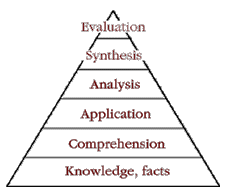 at the top tier is Evaluation (evaluation of material for the
purpose of appraising a desired outcome)
at the top tier is Evaluation (evaluation of material for the
purpose of appraising a desired outcome)
at the second tier is Synthesis (re-creation of material, such as paraphrase, modeling)
at the third tier is Analysis (analyzing material for the purpose of re-creation, algebraic reasoning)
at the fourth tier is Application (applying what one has learned)
at the fifth tier is Comprehension (understanding)
at the foundational tier is Knowledge (memorization, facts)
There are several things we have learned from this research:
With that in mind, let's take a simplified look at what this means in my classroom:
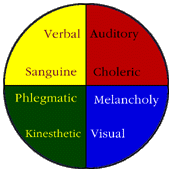 Another model i try to
integrate in my classroom is a combination, or synthesis, of a
simple personality theory and the learning
modalities. The benefit of this is to give students a
method for understanding themselves and others. This is a relatively
simple way to see how they learn best. It is therefore readily
grasped and applied. They aren't "bad" because they can't sit still
(Kinesthetic/Phlegmatic) or NEED to talk
to learn (Sanguine/Verbal). That is the
way God has made them and He asks us to accept ourselves and one
another. Only from that point can we grow to be whole beings.
Another model i try to
integrate in my classroom is a combination, or synthesis, of a
simple personality theory and the learning
modalities. The benefit of this is to give students a
method for understanding themselves and others. This is a relatively
simple way to see how they learn best. It is therefore readily
grasped and applied. They aren't "bad" because they can't sit still
(Kinesthetic/Phlegmatic) or NEED to talk
to learn (Sanguine/Verbal). That is the
way God has made them and He asks us to accept ourselves and one
another. Only from that point can we grow to be whole beings.
Click here to find out more!
There are several things we have learned from this research:
With that in mind, let's take a simplified look at what this means in my classroom:
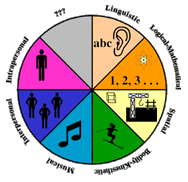 One of my favorite models for
teaching/learning is the Multiple
Intelligence model developed primarily by Howard Gardner. Gardner believes that everyone
is intelligent (you knew you were, didn't you?). Traditionally we
have focused on narrow aspects of intelligence while pretty much
ignoring others. Most standardized testing focuses on Linguistic, Logical-Mathematical, and Spatial Intelligences almost exclusively
(think traditional IQ tests). Gardner reasoned there was more. MUCH
MORE. After all, who cannot say that a four year old Mozart (Musical) reciting pieces, the Michael Jordan
or Nadia Komenichi (Bodily-Kinesthetic), and the deeply spiritual leader,
Mahatama Gandhi or Martin Luther King, Jr., whose examples we strive
to follow (Intrapersonal) are not
equally brilliant? Recently, a couple of other dimensions have been
discussed. First, Gardner himself is toying with the notion of a
"nature" intelligence. Second, a friend
of Gardner has expounded on the social intelligences (Inter and
Intra-personal) to come up with the notion of "emotional" intelligence. This is interesting
and the research seems to indicate that this is THE BEST indicator of
a child's success in life. Apparently, 80%
success can be foreseen by the young child's emotional health at a
young age. The other 20% being intellectual skills, birth
priviledges, and who you know. And finally, a professor of mine
offered a suggestion of a "humor"
intelligence (no he wasn't joking). There are some people who just
seem to be and understand humor more readily than others.
One of my favorite models for
teaching/learning is the Multiple
Intelligence model developed primarily by Howard Gardner. Gardner believes that everyone
is intelligent (you knew you were, didn't you?). Traditionally we
have focused on narrow aspects of intelligence while pretty much
ignoring others. Most standardized testing focuses on Linguistic, Logical-Mathematical, and Spatial Intelligences almost exclusively
(think traditional IQ tests). Gardner reasoned there was more. MUCH
MORE. After all, who cannot say that a four year old Mozart (Musical) reciting pieces, the Michael Jordan
or Nadia Komenichi (Bodily-Kinesthetic), and the deeply spiritual leader,
Mahatama Gandhi or Martin Luther King, Jr., whose examples we strive
to follow (Intrapersonal) are not
equally brilliant? Recently, a couple of other dimensions have been
discussed. First, Gardner himself is toying with the notion of a
"nature" intelligence. Second, a friend
of Gardner has expounded on the social intelligences (Inter and
Intra-personal) to come up with the notion of "emotional" intelligence. This is interesting
and the research seems to indicate that this is THE BEST indicator of
a child's success in life. Apparently, 80%
success can be foreseen by the young child's emotional health at a
young age. The other 20% being intellectual skills, birth
priviledges, and who you know. And finally, a professor of mine
offered a suggestion of a "humor"
intelligence (no he wasn't joking). There are some people who just
seem to be and understand humor more readily than others.
Click here to find out more!
There are several things we have learned from this research:
With that in mind, let's take a simplified look at what this means in my classroom:
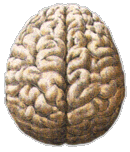 Perhaps the most exciting model to
arrive on the scene is the Brain-based
Learning model. This is fast becoming the premier model in
education today. And why not? If we understand how the brain learns,
we should be better able to teach it (a misnomer really. There are no
teachers just learners. A "teacher" is someone who asks questions
along with you.) This model is all-absorbing and seems to be
exploding with research at the moment. As
teachers and parents, we NEED/HAVE to be informed on what is the best
thing for this, our brain.
Perhaps the most exciting model to
arrive on the scene is the Brain-based
Learning model. This is fast becoming the premier model in
education today. And why not? If we understand how the brain learns,
we should be better able to teach it (a misnomer really. There are no
teachers just learners. A "teacher" is someone who asks questions
along with you.) This model is all-absorbing and seems to be
exploding with research at the moment. As
teachers and parents, we NEED/HAVE to be informed on what is the best
thing for this, our brain.
Ellen White wrote:
"The brain nerves which communicate with the entire system are the only medium through which Heaven can communicate to man, and affect his inmost life. Whatever disturbs the circulation of the electric currents in the nervous system, lessens the strength of the vital powers, and the result is a deadening of the sensibilities of the mind." Counsels on Health, 616; emphasis mine.
There are several things we have learned
from this research: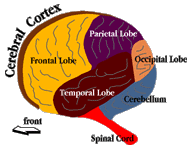
With that in mind, let's take a simplified look at what this means in my classroom:
 then
add--->
then
add---> to get
this--->
to get
this--->
Respectfully yours,
![]()
daniel